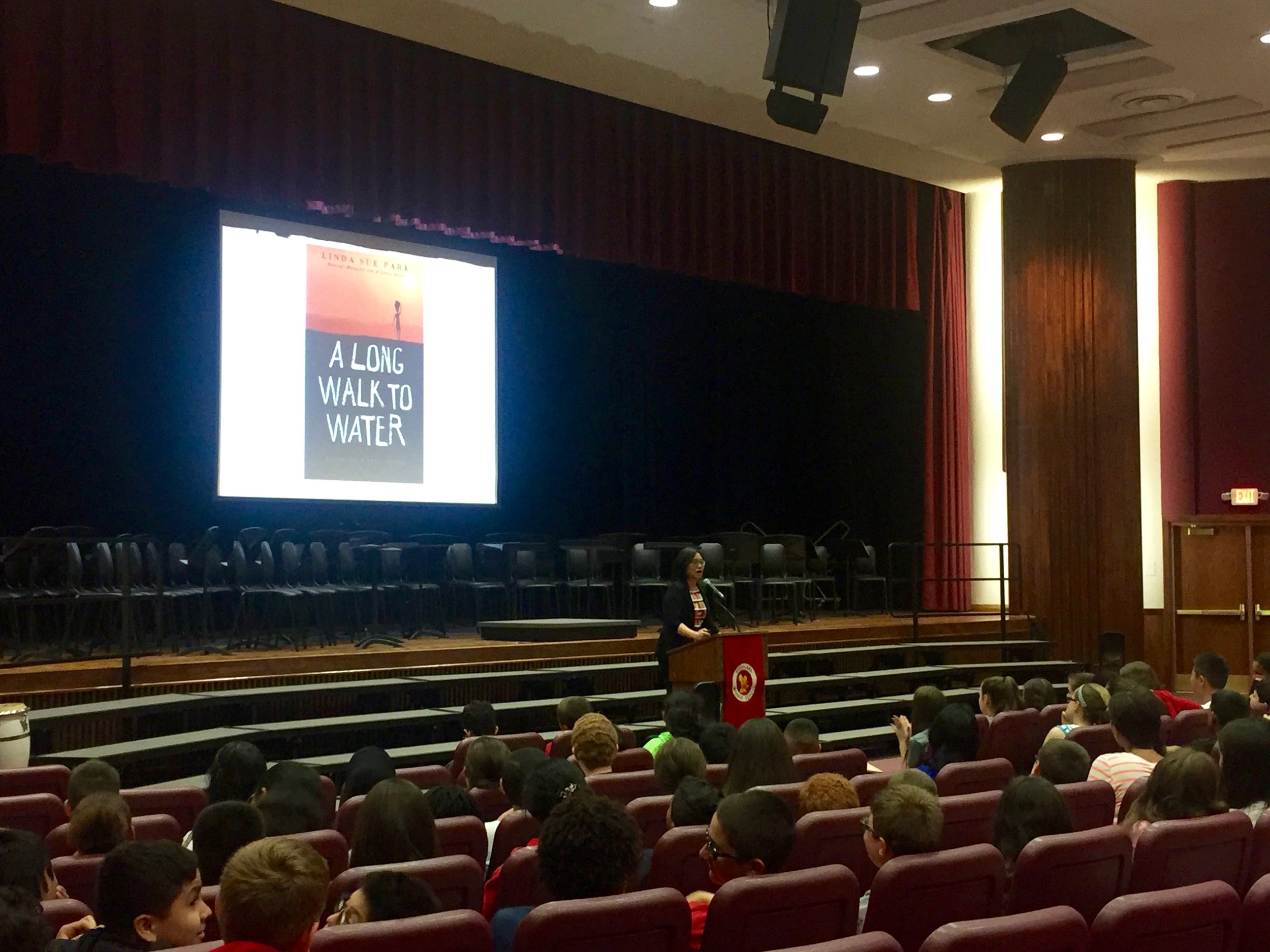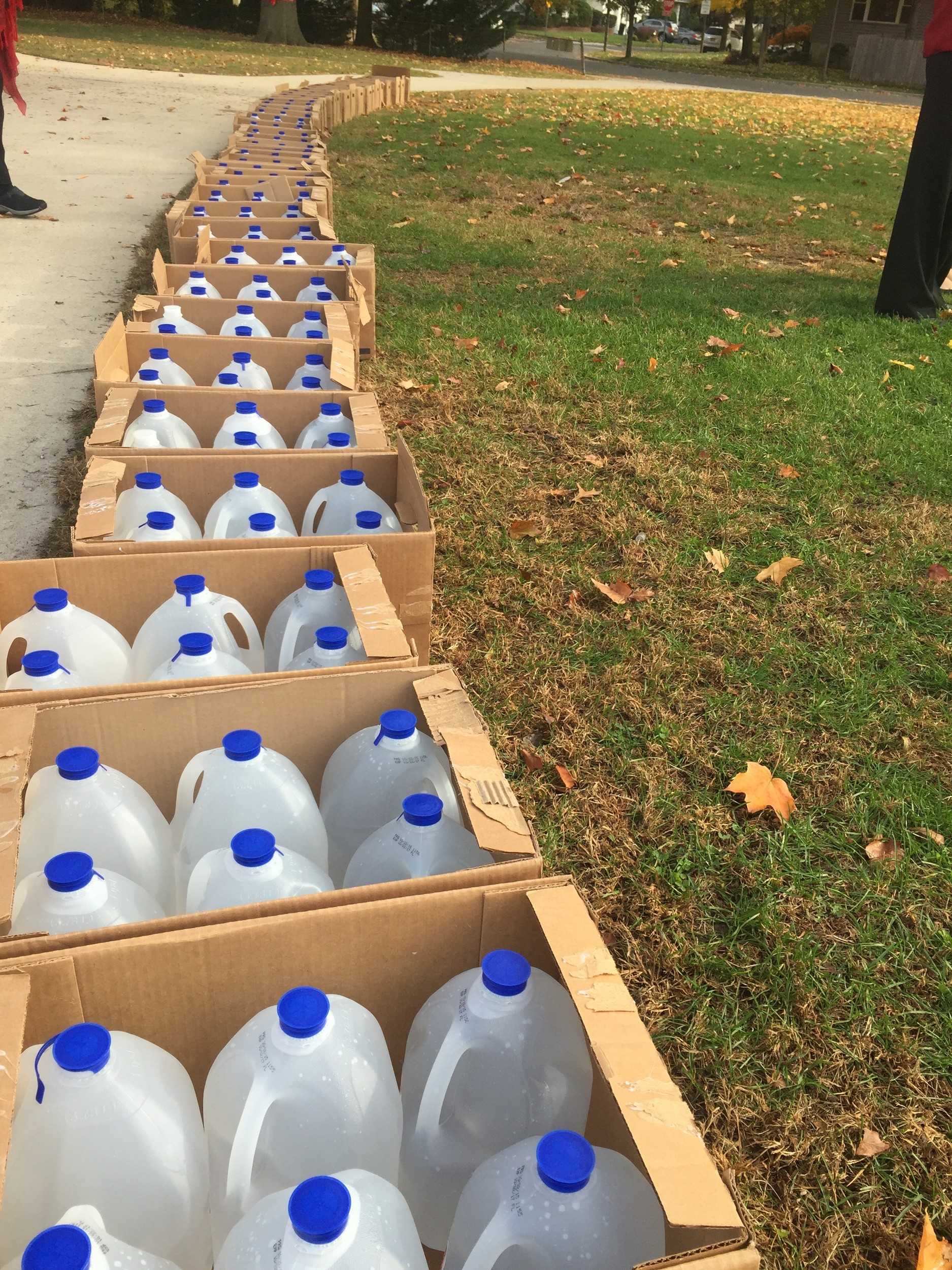Woodland wins charity challenge
Linda Sue Park, acclaimed author, visits middle school

Electricity, the roofs over their heads and clean water are just a few things East Meadow residents have in their everyday lives — and might take for granted. But Salva Dut — a former Sudanese refugee now dedicated to bettering the lives of many in his home country of Sudan with his nonprofit organization, Water for South Sudan — could never do the same.
In 1985, Sudan was wracked by civil war. At just 11, Dut fled the country’s southern region for relative safety in Ethiopia, becoming one of 17,000 “lost boys” separated from their families during the war. Just five years later, Dut led 1,500 of these displaced children across hundreds of desert miles southwest to the United Nations-controlled Kakuma refugee camp near the Kenyan city of Lodawar. He lived in the barbed wire-enclosed camp with 92,000 other refugees for nearly six years.
“A Long Walk to Water,” a short novel by Linda Sue Park, tells Dut’s story of survival in a way that is digestible for all ages, according to educators; it is part of the seventh grade English languages arts curriculum at Woodland Middle School. Students had the chance to speak with Park herself on June 3, as they earned a visit from the New York Times best-selling author for placing second in a fundraising challenge for Dut’s charity.
With the support of the faculty, the students participated in the WFSS Iron Giraffe Challenge by hosting a fundraising campaign in advance of their own walk for water on Nov. 2, 2015. By raising $1,767 for the organization, they placed second out of 130 participating schools around the world.
More than $180,000 was raised globally in 2015-16 and will be used to replace the piece of machinery for which the challenge was named. As of last August, WFSS has drilled 259 water wells, serving hundreds of thousands of South Sudanese; but the drilling rig, which has been used in many remote villages with no roadways, has been damaged over time. A new Iron Giraffe will cost WFSS $500,000, according to the organization.
Dut founded the charity in 2003 after reuniting with his father, who had fallen ill from drinking contaminated water in their village in Sudan. Park explained that, just like a fictional character in “A Long Walk to Water,” Nya, women and girls in the region typically walk eight hours every day to collect a small amount of this unclean water for their drinking and cleaning needs. According to WFSS, providing a close, clean water supply for people living in these areas has allowed women to use newfound free time to attend school, bettering the community as a whole.
Anna Gallagher, an English and special education teacher at Woodland, was inspired by “A Long Walk to Water” and the WFSS mission, seeing an opportunity to connect the events the students were reading about in Park’s novel and a community service project. Bringing the idea to her colleagues, they agreed to ask seventh-grade students to raise money by donating at least $1 to carry one-gallon jugs of water while walking one mile around the school.
Gallager thought that the water walk would allow them to make a connection with the characters in the book — especially the Sudanese women who can’t attend school because they must walk to collect water. Principal James Lethbridge added it made what the students were learning seem “very concrete…because if they see a real life application, a light bulb will go off, and that’s what we’re trying to accomplish.”
About 350 students and faculty participated in the event, which also served as a food and water drive for Island Harvest Food Bank. More than 2,800 pounds of water were given to the local charity — a hunger relief organization with the mission “to end hunger and reduce food waste on Long Island” — as well as 850 pounds of nonperishable foodstuffs sixth-grade students collected.
Randi Shubin Dresner, an East Meadowite and Island Harvest’s president and chief executive officer, said Woodland collected enough food and water to make 1,000 meals for needy families on Long Island at the water walk. Their efforts also earned them the first place prize in Island Harvest’s Students Feeding Students Challenge, which Shubin Dresner presented to students and school officials on March 3.
In addition to these awards, the Anti-Defamation League has recognized Woodland as a “no place for hate” school and a model “mix-it-up” school — seeing as five elementary schools feed into their student body — for the past five years. Lethbridge explained that the Woodland staff prides itself on their character education programs, adding that reading Park’s novel and participating in a multi-tiered fundraiser based on it helped instill the school’s “pay it forward” ideology in students.
Lethbridge said that school officials were pleased that the honor they received from WFSS included the visit from Park. “We were happy that the kids could meet her because it’s a very unique experience to meet the author of a book you’ve read,” he said.
Park spoke in Woodland’s auditorium, talking about her own life as a writer and how Dut inspired her. The students also had the opportunity to ask her questions as well. She gave the students advice on becoming writers themselves, advising them that they can find the inspiration for a story anywhere in their lives.
Park explained that she met Dut through her husband and was immediately taken with his life story. “Initially I was hoping [people] would just be inspired on a personal level by Salva because his story is so incredible,” said Park. “I have been stunned that it has elicited a community response, these young people becoming activists.”
It is important that “the results of their efforts were seen,” Gallagher said of Park’s visit. “They can understand a real person wrote the book, there are real people in the book, and they are also capable of writing books,” she added.






